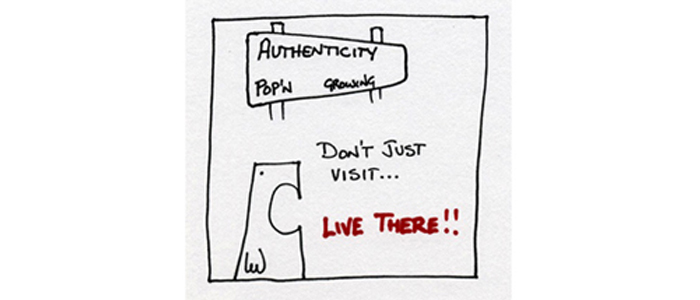Authentic Leadership is the practice of accomplishment through enablement. It is distinct from the more familiar autocratic leadership which seeks aggrandisement through control.
Everyone can be an authentic leader and the first step is to make the choice and the decision to pursue authentic leadership. Like a martial art, authentic leadership is both a lifelong study and an intentional way of life. The choice to be an authentic leader is the choice to pursue its study and its practice. To examine ones own thoughts, habits, actions and reactions and be willing to learn from them and adjust them.
Authentic leadership starts with the pursuit of personal authenticity. Personal authenticity is about continually turning the very best of ourself into a full time habit. It is absolutely not about giving way to one’s basest desires.
To be the best of ourself we need to know ourself, so studying our own habits, thoughts, values, beliefs, motivations and purpose, understanding their origins and their value, their light and their shadow is the first stage of self-study.
Wisdom is defined as putting knowledge into action. So having studied and understood our helpful and unhelpful aspects, our skilful and unskilful behaviours, we need to not only put them into action, but form them into habits that they are so ingrained, they are our default reactions, even under stress.
As Bruce Lee said – I fear not the man who has practised 10,000 kicks once, but I fear the man who has practised one kick 10,000 times. We need to practise these intentions and behaviours over and over until they are ingrained. If we have an intention to be supportive, for example, we must focus on that one habit, until it is reliable. Until we never miss an opportunity to be our best most supportive self. Once we have mastered being supportive, we can move on to our next intention.
When I have set myself an intention to master, I place reminders in my way, like on the lock screen of my phone or on my computer so that I will see them frequently during the day and remember to practise them.
To be an authentic leader we not only need to master ourselves, we also need to master leadership.
Leadership is the ability to influence and enable others to effectively achieve an objective they may not otherwise have achieved. Authentic leadership combines deep personal authenticity with the empowerment of authenticity in others through the pursuit of an objective.
Perhaps the key skill of leadership is influence. Influence is the ability to help someone else change the course they are on. As such, influence is a great responsibility with huge ethical and moral consequences. The aspiring authentic leader needs to also finely tune and calibrate their own moral/ethical compass.
In general, and without re writing the book, ethical choices would be prioritised as follows:
- Global over local
- Longer term over short term
- Inclusion over exclusion
- Transparency over secrecy
- Others over self
Influence starts with trust, as much as is possible in a given circumstance. As a leader we need those we seek to influence to trust us, either directly personally or by reputation. If we have been diligent in our pursuit of our own authenticity, there may not be very much extra work or learning involved in building trust. What we must create in our teams or audience is a sense of psychological safety, they need to feel at ease with us as an individual and with any others who are present, such as team members or colleagues.
To be able to influence others, we first need to understand them. We need to know their motivations, concerns and priorities in order to frame our message in a way that connects with them. This applies as much to groups as it does to individuals and usually requires us to listen first, to practise excellent listening and make it a habit.
Only when we have trust, and understand our audience, is it appropriate to share our message. And by the time we get here our message needs to be so honed, so practised and so clear in our own mind that we can adjust the language and emphasis to suit our audience.
Another key skill of the authentic leader is coaching, specifically the ability to help others to be true to themselves and also to achieve more than they realise they are capable of. To do this the authentic leader will continually feed others with self knowledge and self belief. Helping them understand and play to their strengths and holding them to the best of themselves, while moving away from their unskilful aspects.
A single blog (or book) cannot convey all of the subtle art of authentic leadership, but perhaps it can help to distinguish it from other experiences of leadership we may have had and also encourage some to pursue it.
In these highly disrupted times – technologically, demographically, socially and politically – the one thing we need above all else is exemplary and authentic leadership. Authentic leadership is not only a smart career choice it is also the smart strategic choice for businesses and other organisations seeking sustained success through the disruption.
With thanks to Neil Crofts for this inspiring post.
